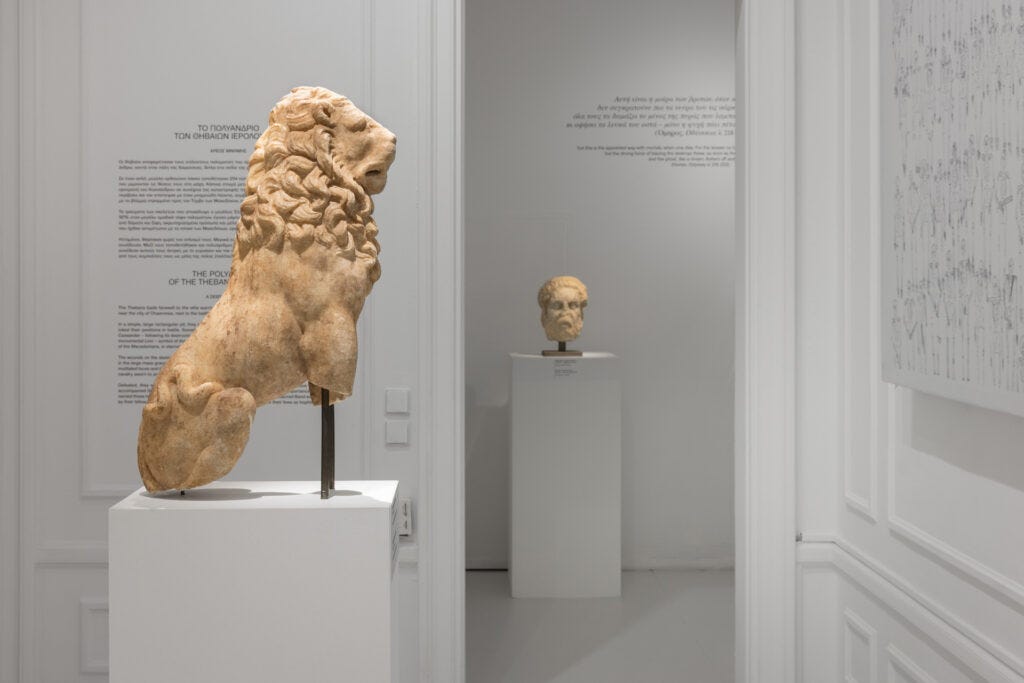In 378 BCE, the gays really were trying to murder you
merry White Lotus season to all that celebrate 🪷 also I have a very exciting announcement ‼️
Hello and happy Monday!
Before we get into the meat of this newsletter, I am beyond THRILLED to tell you that I’m hosting an event with
, , and to celebrate Women’s History Month 🏺 !!!! The event will consist of a panel discussion covering a whole RANGE of topics, from historical research, online newsletters vs. traditional publishing, and tips and tricks for Substack writers. There will also be a Q+A and some mellow networking (facilitated by copious amounts of wine).I really want to take this wonderful
community out of my screen and into an actual room so please, whether you’re a historian, writer, or enthusiast come along 🫶Date: Thursday the 27th of March
Time: 7pm - 9pm
Location: Libreria (an insanely chic/cosy venue)
Tickets: www.cosisodyssey.com/upcomingevents
Here is the event poster (the image on the right is Clio, the muse of History 🥹):
Back to the murderous gays.
If you have, by some MIRACLE, not heard of White Lotus, let me whip you through a rapid TLDR (with some spoilers probably). It’s a great show with an excellent soundtrack and a jumpy timeline (there’s a mysterious death in the first episode of each season that is explained by the following episodes which go BACK in time, kind of like Homer’s Odyssey). The first season was an explosive success, the second season was somehow even better and the third season is not quite hitting the mark in my opinion (I’m not alone). As tempted as I am to start comparing seasons 2 and 3 or spiral about the weird incestuous tones of season 3 (if they fully commit to that storyline I will potentially whip up something on that as the Greek gods loved keeping it in the family), we need to talk about Jennifer Coolidge and her ICONIC line in the final episode of season 2.
This is probably the most heavily memed line from any episode and you really can’t beat Coolidge’s desperate/breathy delivery. Also (spoilers) these gays DID murder her!!!!!! Now I’ve been watching season 3 with the rest of the world and I’m never not thinking about this line so I’ve decided to use it as an excuse to write about the Sacred Band, an ancient Theban army that was made up of male lovers who fought in pairs (also thank you to
for your comment about them on my Achilles and Patroclus newsletter).So, to summarise, in 378 BCE the gays really were trying to murder you.
The Sacred Band of Thebes was an elite military force made up of 150 gay couples, totalling 300 men. It was officially formed in 379-378 BCE when a bunch of pro-democracy Thebans, exiled in Athens, came together and overthrew the Spartan oligarchy that had taken over Thebes three years earlier. Once the Spartans were booted out, the Sacred Band was created, based on the idea that soldiers who cared deeply for one another would fight all the harder to protect their beloved. The creation of this military corps, composed of pairs of male lovers, is, at least to my knowledge, completely unique. And what’s more, they were bloody good at it. The Sacred Band were invincible for four decades until they all fell at the Battle of Chaeronea, where Alexander the Great (only 18 at the time) and his Dad Philip II crushed the combined forces of Thebes and Athens.
My main source for this newsletter is the wonderful book, The Sacred Band, by James Romm, and he includes this sensational quote in his foreword:
The only general that’s never been beaten is Eros.
—Pammenes, leader of Thebes (as quoted by Plutarch)
Romm begins by making the point that most people have heard of Athens and Sparta (and most ancient history nerds have heard of the Peloponnesian War) BUT Thebes doesn’t really get a look in, which is especially wild when Thebes managed to hold its own against the combined forces of Athens and Sparta at one point.
Xenophon wrote the only surviving historical account from this time period BUT he wasn’t exactly a big fan of Thebes as they went up against Sparta who he saw as the natural leader of the Greeks. So we’re working with a VERY biased source. He mentions the Sacred Band ONCE and doesn’t even use this dramatic/moving name, instead referring to them as the “chosen men” which doesn’t have nearly the same oomph.
Enter Plutarch who somewhat redresses this bias, writing Parallel Lives, a pair of biographies about the Greeks and the Romans. He dedicated two biographies to the Theban leaders who commanded the Sacred Band — one of these has been lost to the ravages of time BUT we’ve got the other one! The biography of Pelopidas survives and gives us some precious intel (two paragraphs worth, which may not sound like a lot but god we will take it). He describes how the Band first originated in 378 BCE and absolutely cleaned up battle-wise for 40 years before they went up against Philip II and his son Alexander and were, like so many others, brutally defeated.
Plutarch also explicitly stated why the Band were so formidable as a soldier would be too ashamed to be cowardly in front of their lover and both partners would be brave, finding courage, to protect the other. I mean ❤️🔥
A hot debate continues to rage amongst the meganerds (ahem, scholars) as to whether or not the formation of the group was inspired by Plato, specifically his famous passage about an army of pairs of lovers in Symposium:
So that if we could somewise contrive to have a city or an army composed of lovers and their favourites... and such men as these, when fighting side by side, one might almost consider able to make even a little band victorious over all the world... and without doubt what Homer calls a "fury inspired" by a god in certain heroes is the effect produced on lovers by Eros' peculiar power.
—Plato, Symposium 178-179.
As always, WE MAY NEVER KNOW, BUT Plato’s work tends to be dated to around 385 BCE so it is tentatively/gently/vaguely possible that Gorgidas (the fellow credited with first forming the Band) may have stumbled across it and thought Plato made some points.
Now I don’t want to get too bogged down in the weeds of details, drowning you in a deluge of specific battles and dates (military history was never my thing), but I have to share one specific detail with you because it’s just 🤌
Apparently in around 375 BCE there was a particular moment where the Thebans had figured out that the Spartans had left Orchomenus so they started heading there to fortify it before the Spartans got back. They were making their merry way when they ran into some Spartans — according to Plutarch, one of Pelopidas’ scouts sprinted back, announcing “We have fallen into our enemies’ hands!!!” Pelopidas replied, “Why any more than they into ours?” —Plutarch 17.1
Whoever tf is writing Marvel scripts these days could learn a thing or two, that’s all I’m saying.
Also, when the Thebans and their Sacred Band absolutely smoked the Spartans in the Battle of Leuctra (371 BCE), the general Epaminondas (who was running things at the time) marched along freeing the cities from Spartan rule without subjecting them to Theban domination (a very big deal to break with the colonising tradition previously set up by both Athens and Sparta). We love an actual liberator!!!!
Now you could, quite convincingly, call bullshit on all of this — you may be wondering where the hell is the actual evidence for the Sacred Band if the written sources are patchy/biased/nonexistent. And it’s a valid question. But I am thrilled to tell you that archaeology saves the day!!! But also it’s quite heartbreaking. To access the archaeological receipts, we must look to the moment where it all fell apart at the end of four stellar decades, the Battle of Chaeronea.
So Philip II (Alexander the Great’s dad) had actually spent three years in Thebes as a hostage back in the day so he had first-hand intel when it came to the brutal efficacy of the Theban army. He used what he learned in Thebes when he came to power in Macedon, improving upon the phalanx by giving his soldiers more reach with slightly longer weapons. Right before Chaeronea, Philip II had already conquered most of Greece so Athens allied with Thebes for what would end up being their last stand. Not only did the Macedonian force outnumber the Greeks 3 to 1, they were also dealing with the deadly combo of the old bull and the young calf, Philip II and his son Alexander (the Great came later).
The Sacred Band refused to surrender, fighting until every last one of them had fallen.
According to Plutarch, Philip II himself mourned the valiant warriors:
And when Philip was looking over the dead after the battle, he stopped at that place at which it happened that the Three Hundred had fallen, in their armor, after having met, every one of them, the sarissas head on, all mixed up with one another. It is said that he was amazed by the sight, and, on discovering that this was the band of the erastai and the erōmenoi, wept and said 'May those that suppose that these men do or suffer something shameful perish!'
—Plutarch, Pelopidas 18.5.
They were buried on the battlefield and a monumental Lion sculpture was erected over the site as a sign of their bravery. I was lucky enough to visit the Cycladic Museum in Athens in January last year when they had this spectacularly moving temporary exhibition titled Chaeronea, 2 August 338 BC: A day that changed the world. If I’d known I’d be writing a newsletter about the Sacred Band a year later I probably would’ve taken more photos but in all honesty it felt a bit inappropriate or disrespectful somehow. Credit to the organisers and curators for creating a space that actually felt sacred, an appropriate immortalisation of the battle and the fallen men.

Why the Sacred Band isn’t exactly a household name goes without saying but goddamn it I’m going to say it anyway. Decades, or, more accurately, centuries of scholarly homophobia has relegated this particular piece of ancient Greek history to a dusty, dark corner of the metaphorical library.
Romm ends his introduction with a wonderful, admirable point that I’d really like to echo here.
“My admittedly narrow focus on Thebes, and on its Sacred Band, springs from my sense that little-told stories are the ones that most need to be told, especially when—as in the Theban case—the protagonists had no historians of their own.”
To little-told stories finally getting some much-deserved airtime 🥂
xxxxxxxxx









I will now willfully mistranslate “Così fan Tutte” as “Cosi does it all” to reflect your thorough scholarship and unfailing humor, both much appreciated.
Next: the Amazons. A society without men whose courage in combat was, well, legendary,
and whose archery was so important they excised a breast lest it impede the bowstring.
And there’s a link to Achilles Podarkes, too. He vanquished Penthesilea, queen of the Amazons, in a battle to the death outside the topless towers of Ilium. Amazons were also topless, of course.
this was my first time reading one of your posts and i loved it ❤️🔥❤️🔥 such a cool story